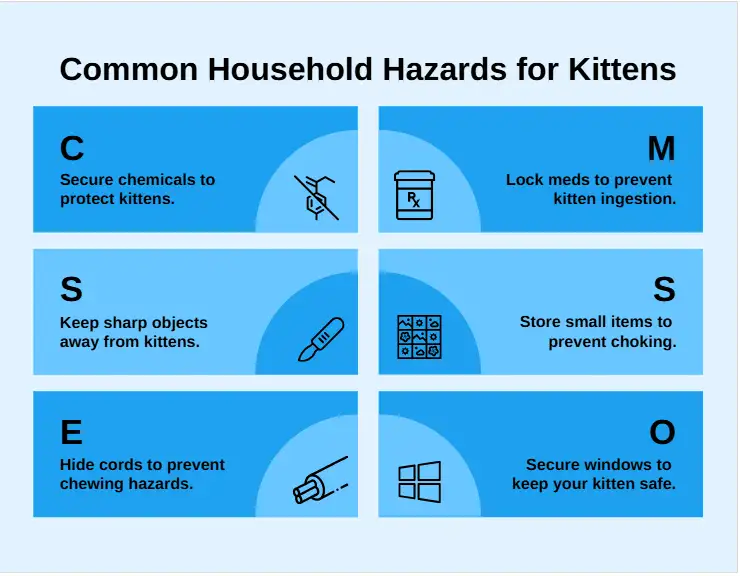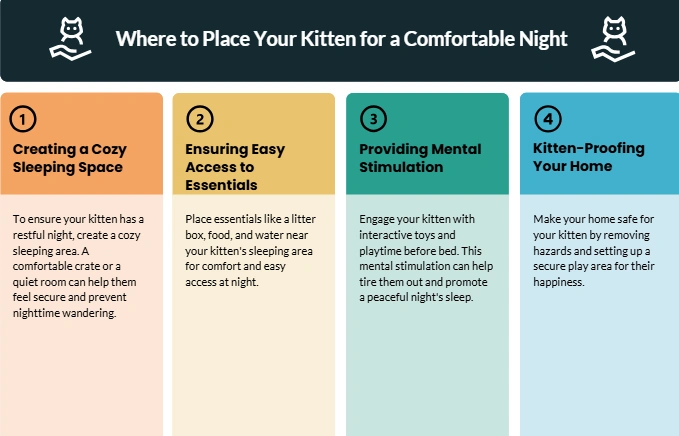How to Kitten-Proof Your Home: A Complete Guide for New Cat Parents
Purr-fectly Safe: Cat-Proofing Your Home for Your Kitten's Safety
Welcoming a new kitten into your home can be an exciting and joyous time. However, before you let your little furry friend roam around freely, you need to ensure that your home is safe and secure. In this blog post, we’ll cover everything you need to know about cat-proofing your home, including how to make it a safe and comfortable space for your new furry family member.
As a cat behavior specialist, you know how important it is to provide a secure and safe environment for your feline friend. Kittens are naturally curious and can easily get into mischief, so taking the necessary steps to kitten-proof your home is crucial for their well-being. In this article, we’ll go through everything you need to do to make your home a safe haven for your new kitten.
How to Keep Your Kitten Safe While You’re Away ?

Why is it important to cat-proof your home?
Before bringing your kitten home, it is essential to ensure that your home is a safe space. Cats are curious animals and love to explore their surroundings. However, this curiosity can lead them to investigate potential hazards that can harm them. Therefore, it is vital to cat-proof your home to ensure your kitten’s safety.
The first step in making your home safe for your kitten is to do a thorough walk-through and identify any potential dangers. Sharp edges, loose wires and cords, and small items that your kitten could choke on are just a few examples of common hazards. Be sure to secure or remove these hazards to reduce the risk of injury to your kitten.
Next, create a designated play area for your kitten. This could be a room in your home or just a corner, but it should be free of hazards and equipped with plenty of toys, a scratching post, and a comfortable bed. Make sure your kitten has access to this area at all times and supervise them while they play to prevent accidents.

The only thumb rule is to be patient! Good Luck!
Assessing potential hazards in your home - Common Household Hazards for Kittens
The first step in cat-proofing your home is to assess any potential hazards. Look around your home and identify any items that could be dangerous to your kitten. Some of the common hazards include:
- Chemicals and cleaning products
- Medications
- Sharp objects
- Small objects that your kitten could swallow
- Electrical cords and cables
- Open windows and balconies
It’s also crucial to store household chemicals, such as cleaning products and medications, safely and out of reach. Keep these items locked up or in a cabinet with a secure latch to avoid accidental ingestion by your kitten.
Be mindful of hazardous areas in your home, such as the kitchen stove and oven, open fires, and hot surfaces. Keep these areas off-limits to your kitten and supervise them whenever they are in the kitchen.

Tips for cat-proofing your home
Once you have identified the potential hazards, it’s time to take action to eliminate or minimize them. Here are some tips for cat-proofing your home:
- Keep hazardous items out of reach: Store hazardous items such as cleaning products, chemicals, and medications out of reach of your kitten.
- Secure cords and cables: Cover electrical cords and cables or keep them out of your kitten’s reach to prevent electrocution.
- Install window screens and balcony nets: Install window screens and balcony nets to prevent your kitten from falling or jumping out of open windows or balconies.
- Ensure that all doors and windows are securely closed: Keep all doors and windows closed to prevent your kitten from escaping or getting trapped outside.
- Create safe spaces for your kitten to play and rest: Create a safe and comfortable space for your kitten with plenty of toys, a cozy bed, and a litter box.
Maintaining a clean and hygienic environment is key to keeping your kitten safe and healthy. Clean up any spills or messes immediately, and keep your kitten’s litter box cleaned daily and in a safe, easily accessible location.
Also read : How to take Care of Persian Cats at Home – 3 Ways

Where to put your kitten at night ?
It is essential to provide a comfortable sleeping space for your kitten. You can keep your kitten in a cozy crate or a separate room at night to prevent them from wandering around unsupervised. Make sure to keep a litter box, water, and food nearby.
Kittens sleep a lot, but they also wake up frequently. To help your kitten sleep through the night, provide them with plenty of toys to keep them entertained. Ensure that their sleeping space is comfortable and cozy, and their litter box, water, and food are easily accessible.
In addition to these practical steps, it’s essential to provide plenty of mental stimulation for your kitten. Interactive play, toys, and positive reinforcement training can all help keep your kitten’s mind and body active, preventing boredom and destructive behavior.
In conclusion, kitten-proofing your home is a critical aspect of ensuring the happiness and well-being of your feline friend. By taking the time to identify and remove hazards, create a safe play area, and provide mental stimulation, you can provide a safe and secure environment for your kitten to thrive.
We also have breeds like Persian, Ragdoll, Maine Coon, Siamese, Exotic Shorthair, Bengal, British Shorthair


